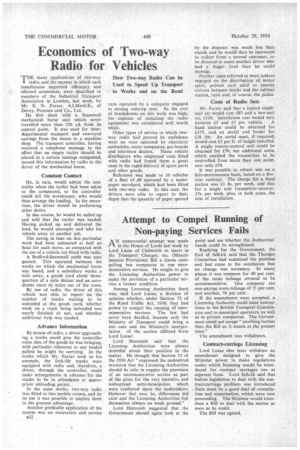Attempt to Compel Running Non-paying Services Fails
Page 56

If you've noticed an error in this article please click here to report it so we can fix it.
AN unsuccessful attempt was made in the House of Lords last week by Lord Lucas of Chilworth to insert in the Transport Charges, etc. (Miscellaneous Provisions) Bill a clause compelling bus companies to run unremunerative services.. He sought to give the Licensing Authorities power to make the provision of a particular service a licence condition.
Among Licensing Authorities there was, said Lord Lucas, a division of opinion whether, under Section 72 of the Road Traffic Act, 1930, they had power to compel the running of unremunerative services. The law had never been decided, because only the Ministry of Transport could bring a test case and the Ministry's interpretation of the section differed from Lord Lucas'.
Lord Hurcomb said that the Licensing Authorities were always doubtful about their position in the matter. He thought that Section 72 of the 1930 Act "expressed the undoubted intention that the Licensing Authorities should be able to require the provision of an unremunerative service as part of the price for the very lucrative and widespread semi-monopolies which were conferred upon the undertakers. However that may be, differences did exist and the Licensing Authorities fell themselves always on weak ground."
Lord Hurcomb suggested that the Government should again look at the point and see whether the Authorities' hands could be strengthened.
Replying for the Government, the Earl of Selkirk said that the Thesiger Committee had examined the problem and had come to the conclusion that no change was necessary. in many plades it was common for 40 per cent of the route Mileage covered to be unremunerative. One company ran non-paying route mileage of 71 per cent. and another, 76 per cent.
If the amendment were accepted, a Licensing Authority could issue instructions to the British Transport Commission and to municipal operators, as well as to private companies. The Government could not accept "anything further than the Bill as it stands at the present time."
The amendment was withdrawn.
Contract-carriage Licensing Lord Lucas also later withdrew an amendment designed to give the Minister power to make regulations under which licensing would be introduced for contract carriages run at separate fares. Lord Selkirk said that before legislation to deal with the contract-carriage problem was introduced there must be a good deal of consultation and examination, which were now proceeding. The Minister would introduce a Bill to deal with the matter as soon as he could.
The Bill was agreed.




























































































